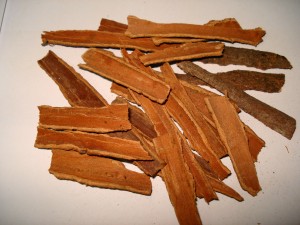Cinnamon, cardamom and cloves are typical Christmas spices, but all three are also commonly used in Asian (especially South Asian) cooking. They are typical ingredients in Indian spiced tea, masala chai, and they are also used in India’s Ayurvedic medicine. Indian cuisine uses these spices for their flavor but also for their ability to help digestion. All three spices can relieve digestive upsets when used in foods or when made into infusions.
Cinnamon
The cinnamon spice comes from the bark of the cinnamon tree (Cinnamomum zeylanicum) that grows in many tropical areas and is a native to Madagascar and parts of Southeast Asia. It is also cultivated in other parts of the world. Used in cooking or in an infusion (tea), cinnamon can help to relieve nausea, diarrhoea, stomach cramps and flatulence.
Cinnamon is one of the most warming exotic spices and a good spice to use during the cold winter season. When the weather turns cold, if you are feeling chilled or are getting a cold, make a spicy Indian tea (chai). Here are some good recipes, or try tea blends that contain cinnamon, such as the Yogi tea range.
Cardamom
Cardamom (Elettaria cardamomum) grows in India, Sri Lanka, China and the Middle East, and it has been used in India’s Ayurvedic medicine for thousands of years. In the West, cardamon is used mainly in Christmas-time baking, but it can also bring new flavor to teas and coffees. Chewing cardamom pods helps to freshen the breath, and cardamom is also good for digestive problems: nausea, flatulence, heartburn and diarrhoea.
Cloves
Cloves are another traditional Christmas spice. The cloves used in cooking are unopened buds from the clove tree (Eugenia caryophyllus) that originates from Indonesia but grows in many other tropical countries. The most widely known of clove uses is as a quick home remedy for toothache: put a whole clove in the painful spot in the mouth. Chewing on a whole clove helps to remove bad breath. Like the other spices, cloves can be used in cooking or made into an infusion to relieve digestive problems, such as stomach cramps and diarrhea.
Clove has been used in traditional and folk medicine to prevent contagious illnesses. Burn clove essential oil at home in an essential oil burner or a diffuser during cold and flu epidemics. The oil blends well with orange essential oil, and together with orange and the other spice oils it creates a nice Christmas scent. The essential oil of clove is a potent antiseptic, but also a potent skin irritant and, like all spice oils, should be well diluted if used on the skin.
Sources:
Lesley Bremness: The Complete Book of Herbs (Studio, 1994)
Patricia Davis: Aromatherapy, an A-Z (Random House, UK, 2004)
Photo: Miansari66 (Wikimedia Commons)





